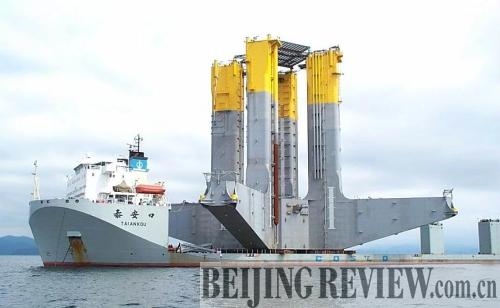|
 |
|
SENDING OUT AN SOS: A COSCO ship transports a large piece of equipment. The financial crisis continues to affect the ocean-shipping industry, including big companies like China COSCO (XINHUA) |
As China's economy sails into calmer seas on its course to recovery, China Ocean-Shipping (Group) Co. (China COSCO) experienced choppier waters with lower performance improvements than anticipated. In its quarterly report released on October 30, 2009, China COSCO said that from January to September its operating revenue totaled 38.6 billion yuan ($5.65 billion), a drop of 59.5 percent compared with the amount of 95 billion yuan ($13.91 billion) during the same period last year.
Kept in the doldrums by the financial crisis, decreases in both freight volumes and cargo fees have contributed to the marked decline in operating revenue, the China COSCO report stated.
Registered in March 2005, China COSCO is the biggest ocean-shipping company in China. In June 2005, China COSCO was listed on the main board of the Hong Kong Exchanges and Clearing Ltd. Two years later, in June 2007, it was listed on the Shanghai Stock Exchange.
China COSCO mainly engages in container and dry bulk shipping. In early 2008, China COSCO had a container fleet of 144 vessels with a total capacity of 435,138 TEUs, ranking sixth in the world in terms of fleet size. It also has a dry bulk fleet of 419 vessels with a total capacity of 32.98 million deadweight tons, the world's largest dry bulk fleet.
The financial crisis has so far seen bigger companies facing bigger problems. China COSCO is no exception. As the captain of the Chinese ocean-shipping industry, China COSCO has had to navigate around larger obstacles than its competitors as it tries to stay afloat.
Stagnant waters
The Baltic Dry Index (BDI), issued daily by the London-based Baltic Exchange, tracks the worldwide international shipping prices of various dry bulk cargoes, reflecting the business climate of the ocean-shipping industry. If the index increases, it reflects that the economies of the world are in shipshape, international trade is prosperous and ocean-shipping companies are accruing profits.
During the months leading up to the financial crisis, the BDI dropped, indicating that international trade had taken a hit. After the financial crisis broke out, the BDI continued to sink rapidly.
According to the figures released by the Baltic Exchange, on May 20, 2008, the index reached 11,793 points, a record high since its introduction in 1985. Half a year later, on December 5, the index dropped by 94 percent to 663 points, the lowest since 1986. The index rebounded after that and recovered its lost ground to 1,316 points on November 6 this year.
Affected by the sharp decline of the BDI since the fourth quarter of last year, China COSCO's forward freight agreement suffered a huge amount of floating losses, the announcement stated. Although the economic returns of the company increased during BDI rebounds this year, the gains have been inadequate to make up for the huge losses.
China COSCO, while taking on the most water as profits sank, has not been the only victim of the financial crisis. Sharp declines in shipping prices and freight volumes, as well as financing difficulties, have placed burdens on the Chinese ocean-shipping industry as a whole.
| 